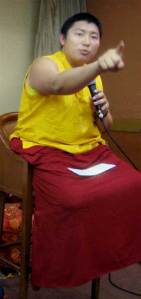His Holiness Phakchok Rinpoche completed his tour of Bangkok with a lively talk to a packed room especially for our English speaking Sangha. It was nice to give him free reign without the constraints of stopping every couple of minutes for translation. And very nice for the English speaking Sangha of Bangkok to come together for lunch and dhamma.
Topic
 The original suggested topic had been “What practises of Tibetan Buddhism would contribute to Theravada Buddhism.”
The original suggested topic had been “What practises of Tibetan Buddhism would contribute to Theravada Buddhism.”
The idea of such a question is that many of our English speaking Sangha have been bred on a diet of Theravada Vipassana practises. Our goal of enlightenment is the same (even if the Bodhisattva vow makes a distinction), so what exact practises does Tibetan Buddhism have to offer that perhaps we should add to our current practises? How can Tibetan Buddhism enhance the practise of Theravadins?
The question kind of got waylaid. First, some of the other organisers added in some interesting, but very divergent questions relating to living and dying. And then Rinpoche seemed to prefer a topic revolving around Amidha Buddha (an extension of the ‘dying’ topic). Advised that not many Westerners had heard of Amidha Buddha, which is part of the Pure Land school of Buddhism, he returned to the Theravada/Vajrayana topic, but from a different angle – that of the differences and similarities between the two systems. Finally we gave him free reign to talk as he chose, since the audience would be sure to appreciate regardless.
Perched high on a requisitioned bar stool, and working from a list of differences, he entertained and captivated the audience despite the crowded condtions and rising temperatures. (It was not the temperature that made him sweat, but the difficult question!)
Diversification
Naturally, there was the respectful nod at the outset that he was not aiming to show anything ‘superior’ or to denigrate ‘my Theravada brothers’. The different schools of Budhdism get along very well. In fact, it might be observed that Theravada schools will distance themselves from other Theravadins, while being quite at home with Tibetans or Zen. The same can be seen in Christianity – some of the lineages argue with each other bitterly, but ignore the Buddhists or Hindus etc.. Kind of like the stray cats in the temple. They simply avoid the dogs, but fight and squabble with other cats.
Differences in approach to Buddhism are to be celebrated. Even in the Buddha’s time he recognised different monks for being proficient in different aspects of the practise. Kassapa was foremost for renunciation. Sariputta for wisdom and Moggallana for meditation. Anuruddha was foremost for developing the aloka Kasina (sphere of light) and gaining celestial vision. It was he who followed the samadhi states of the Buddha in his final moments. Even within a single temple, there are the working monks, the administrators, the meditators, the teachers, the scholars …
Still, interpreting the question as ‘the differences between Theravada and Vajrayana’ made for a difficult talk – kind of ‘we think this, they think that’ kind of format. Rinpoche commented a few times this was tricky to negotiate (and made him sweat) and yet the audience seemed oblivious to any difficulty. We come to learn. And the two hours or so of the talk did not seem burdensome in the least, floundering air-con aside.
The Event

So, in the Tai Pan we had almost 60 for lunch – Thank you to the 40+ who let me know in advance that you were coming, so I could reserve tables (hint!). Hopefully everyone enjoyed meeting the other faces over lunch. The lunch is 175 baht +tax = 206 baht. With our 10% discount we paid 185 baht each. Collecting 200 baht/person includes a 15baht tip for the hotel (who do look after us very well). Squeezing into the meeting room were about 100 people. There is lots of space if you don’t mind scrunching up together (!). In fact the room divides into two parts – but we could hire only one part, since another party were occupying the other half (and shaming us by providing its participants with coffee).
This marked something of a first in terms of the coming together of the English speaking sangha of Bangkok, both Theravada and Tibetan, Thai, Asian and Western.
Anumodana (thanks) to
- David G. for donating the 2500 baht room hire cost.
- Khun Tii and family for covering all the monks lunch costs.
- Phra Pandit – for the nifty maps to HHPCR events, ferrying the sound system etc.. 🙂
- Jamie and Tu of the Bangkok Shambhala meditators group for setting up the room etc…
- Ram and Jarunee for tireless work and support setting up these events every year.
- Dr Will and Jamie for the unenviable task of sorting the Hotel bill for food.
- and to everyone else.
Donations were meant for HH Phakchok Rinpoche’s travel expenses, but he passed them back to us. After donating for the Bhikkhu’s taxi fares back to their temples, we were left with about 8000 baht. This we will keep in a separate shoe box from general Littlebang donations (currently at about 24 000 baht) until HHPCR’s next visit, and then use it to contribute to air fares and/or in other appropriate ways to facilitate his teaching in Bangkok.
Update: the sound recording is unintelligible, so there will be no Mp3 file of the talk – so sorry.